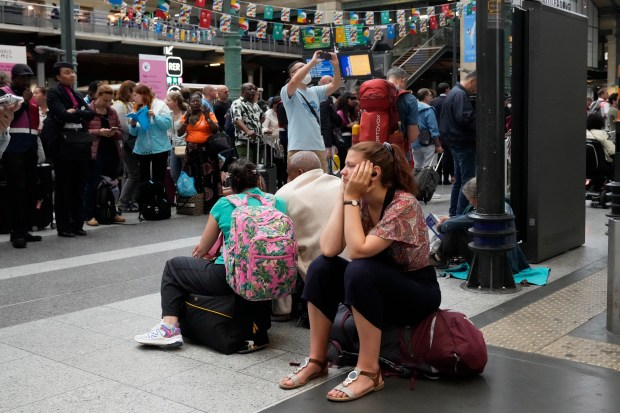PARIS — The Paris Olympics are officially underway, just hours after “malicious” attacks on major French rail routes.
The attacks, which included arson, disrupted rail service throughout the country Friday and cast a shadow over a highly anticipated ceremony that uses the Seine River as its centerpiece.
Athletes are expected to float down the river on barges, marking the first time in modern Olympic history that the parade of nations has taken place outside a stadium. The ceremony’s nontraditional format has made the ceremony a popular topic of conversation among athletes in recent days, with everyone from first-time Olympians to multiple medal winners talking about it.
“I don’t know what to expect, but I can’t wait,” U.S. Greco-Roman wrestler Kamal Bey, who grew up in suburban Bellwood and is competing in his first Olympics. “I have my uniform and I’m excited. I hope they give me a lifejacket to put over my blazer because I do not know how to swim.”
About 350 U.S. athletes are expected to participate in the opening ceremony, representing about 60% of the total American delegation. Tennis star Coco Gauff and NBA legend LeBron James were selected to be flag bearers.
“The Opening Ceremony is a special event,” U.S. basketball star Kevin Durant said. “You get to see all the great athletes representing their country and the pride you have for your country just goes to another level. I am excited. We have never done a boat on the river. We usually walk around a stadium, so that will be a new experience for me. I’m looking forward to it.”
Per tradition, the rest of the ceremony has been kept tightly under wraps but, based on rehearsals along the Seine this week, spectators should expect to see skateboarders and BMX freestylers performing tricks on piers in the middle of the river. Popstars Celine Dion and Lady Gaga are rumored to be performing, as well.
As the athletic competition officially begins, many questions about the 2024 Summer Games remain unanswered. The biggest concern has been safety, with the railway attacks underscoring the herculean task of keeping athletes, spectators and vulnerable infrastructure secure.
French officials raised the country’s national security alert system to its highest level after 144 people were killed in a concert hall bombing in Moscow earlier this year. While a potential terrorist attack remains the top safety issue, organizers also are monitoring potential disruptions caused by a confluence of protests involving labor issues, the pro-Palestine movement and anti-Olympic sentiment in an already politically fractured country.
The IOC did not respond to requests for comment regarding the train attacks. Paris 2024 Olympic Committee canceled its pre-opening ceremony press conference scheduled for Friday morning and did not respond to requests for comment.
Outgoing French Prime Minister Gabriel Attal called the attacks “act of sabotage” and said they were carried out “in a planned and coordinated” manor.
“Our intelligence services and law enforcement are mobilized to find and punish the perpetrators of these criminal acts,” he said in a post on X.
In addition to security concerns, questions also remain as to whether the Seine River will be clean enough for triathletes and marathon swimmers to bathe in, given the water’s E. coli levels frequently surpass the safety standards in Europe and the United States. Rain is forecast in the coming days, which often makes the river unsafe for swimming.
Paris Mayor Anne Hidalgo swam in the water earlier this month to bolster confidence in its cleanliness. President Emmanuel Macron did not make good on his promise to join her.
And Paris 2024 CEO Etienne Thobois has predicted the river will be the Games’ most enduring legacy.
“I’m pretty sure that when we have 25 areas where people will be able to swim after the Games, the reference to the Paris 2024 Games will stay for a long time,” Thobois said earlier this week. “That will be a symbol.”



